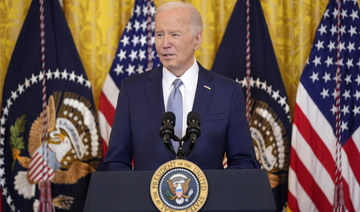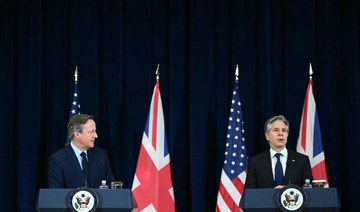PARIS: French President Emmanuel Macron opened the door on Monday to European nations sending troops to Ukraine, although he cautioned that there was no consensus at this stage as allies agreed to ramp up efforts to deliver more munitions to Kyiv.
Some 20 European leaders gathered in Paris on Monday to send Russian President Vladimir Putin a message of European resolve on Ukraine and counter the Kremlin’s narrative that Russia is bound to win a war now in its third year.
“There is no consensus at this stage ... to send troops on the ground,” Macron told reporters. “Nothing should be excluded. We will do everything that we must so that Russia does not win.”
Sweden, which is set to join NATO, said on Tuesday it did not currently envision sending ground troops into Ukraine.
“It’s not on the cards at all for the moment,” Prime Minister Ulf Kristersson told Swedish public broadcaster SVT, the day after his country cleared the final obstacle to joining the transatlantic military alliance.
“For the moment, we’re busy sending advanced (military) equipment to Ukraine,” Kristersson said, reacting to comments by French president.
Stockholm announced on February 20 it would give Ukraine defense aid worth $682 million (7.1 billion kronor), including artillery shells, air defence, boats, mines, torpedoes, and training for Ukrainian soldiers.”
A White House official told Reuters that the United States had no plans to send troops to fight in Ukraine and that there were also no plans to send NATO troops to fight in Ukraine.
Macron invited his European counterparts to the Elysee palace for a hastily arranged meeting to discuss how to ramp up ammunition supplies to Ukraine amid what his advisers say is an escalation in Russian aggression over the past few weeks.
After initial successes in pushing back the Russian army, Ukraine has suffered setbacks on eastern battlefields, with its generals complaining of shortages of arms and soldiers.
Slovak Prime Minister Robert Fico, who has opposed military aid to Ukraine, said several NATO and EU members were considering sending soldiers to Ukraine on a bilateral basis.
“I can confirm there are countries that are prepared to send their own troops to Ukraine, there are countries that say never, among which Slovakia belongs, and there are countries that say this proposal needs to be considered,” he said before boarding his plane home.
Dutch Prime Minister Mark Rutte, who is the frontrunner to become the next secretary general of NATO, told reporters the issue of sending troops was not the focus of Monday’s talks.
Addressing the leaders via videolink, Ukrainian President Volodymyr Zelensky backed Macron’s warning about an escalation of the conflict: “We must ensure that Putin cannot destroy our achievements and cannot expand his aggression to other nations.”
Macron said: “Many people who say ‘Never, never’ today were the same people who said ‘never tanks, never planes, never long-range missiles’ two years ago
“Let us have the humility to note that we have often been six to twelve months late. This was the objective of this evening’s discussion: everything is possible if it is useful to achieve our objective,” he said, adding that Europe should not depend on the United States to fight in Ukraine.
MORE AMMUNITION
There was progress on a Czech-led initiative to buy hundreds of thousands of ammunition rounds from third countries, something that France has been cautious about as it wants to prioritize developing Europe’s own industry.
Ammunition supplies have become a critical issue for Kyiv. The European Union, though, is falling short of its target of sending Ukraine a million rounds of artillery shells by March.
Czech Prime Minister Petr Fiala said about 15 countries had agreed to sign up to his initiative. Macron said Paris would also do so and that a coalition to speed up delivery of long-range missiles had also been agreed.
“We are talking about hundreds of thousands of pieces of ammunition we should and could get in relatively short time,” Fiala told reporters.
Defense ministers had been mandated to come up with a plan within the next 10 days, Portugal’s Prime Minister Antonio Costa said.
Rutte said the Netherlands would contribute 100 million euros ($108.5 million) for the purchase of munitions overseas. He said the countries that would provide the munitions had asked not to be identified.
“I think there was a great sense of urgency, particularly for the short-term on ammunition and on air defense,” Rutte said. “I hope other countries will follow.”
German Chancellor Olaf Scholz, British foreign minister David Cameron as well as leaders from Scandinavian and Baltic nations, were among those also attending.
The United States, which has been under much scrutiny as its latest military aid package for Ukraine has stalled in Congress, was represented by Assistant Secretary of State for European and Eurasian Affairs Jim O’Brien.
French officials said Macron, who is due in Kyiv in March, was keen to seek solutions after a security conference in Munich this month failed to make progress.
“We’re neither doomy nor gloomy,” the French adviser said. “We want Russia to understand that. Russia will have to count on us all collectively to end this war.”
French officials said Russia has shown renewed aggression in recent weeks, including Putin’s flight on a nuclear-capable bomber, in what they view as an attempt to intimidate Europeans at a time US support is thrown into doubt by the presidential election.


























